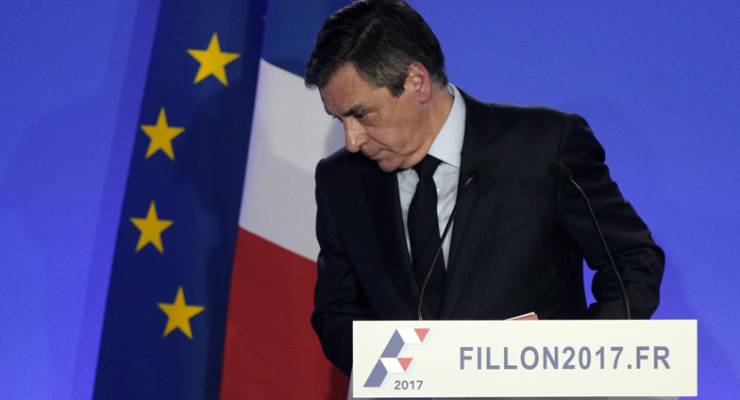
Well, that didn’t take long. Late last month, Crikey smugly affirmed the near certain victory of conservative candidate for Les Republicains’ Francois Fillon in France’s April/May presidential election. Fortunately, we added the caveat that, in France, there is often une surprise.
Since then, there have been more than une. Plusiers, in fact.
The most dramatic are the multiple allegations that Fillon acted at various stages in his political career to enrich himself and his family corruptly. The amounts involved are surprising, as is the ease with which evidence of fraud seems to be coming to light.
The most damning claims are that between 1998 and 2007 he arranged payments to his wife of more than A$840,000 for work she didn’t do and further substantial payments to two of his children while they were students. Not only is there no evidence that Madame Fillon — a quiet Welsh mother of five — did any work for her husband, but a 2007 interview has turned up with her declaring: “I have never been his assistant or anything of the sort.”
[Right-wing France will beat the crepe out of leftists come polling day, unless …]
The total alleged corrupt payments are above 1 million euros — A$1.4 million — according to former Sarkozy ministerial colleague Rachida Dati. An official investigation is underway, which has already raided Fillon’s parliamentary offices. No charges have yet been laid. Fillon is asserting his innocence.
Intriguing questions are now swirling about who leaked to the police and the press information damaging to la famille Fillon. And who might replace him as the Republicans’ candidate, if he steps aside.
Fillon defeated former prime minister Alain Juppe and former president Nicolas Sarkozy in the Republicans’ primary in November. Unsurprisingly, suspicions have arisen regarding their possible roles in unearthing the evidence. Both Juppe and Sarkozy are probably still smarting from Fillon’s primary campaign strategy against them, which included references to their past scandals. Juppe was banned from political life for a year in 2005 following a conviction for funding phantom jobs for friends. Sarkozy is currently under investigation for alleged illegal campaign financing.
In another surprise, the likely replacement being touted should Fillon withdraw is current Senate president Gerard Larcher, rather than Juppe or Sarkozy. Other possibilities, less likely, include former Sarkozy ministers Xavier Bertrand and Francois Baroin.
In seeking to tough out the allegations, Fillon will be encouraged by French history, which has countless examples of financial irregularities, large and small. Some have been politically fatal, but not all. Jacques Chirac was convicted of accepting hundreds of thousands in cash in suitcases but continued as president. Sarkozy also survived a 2007 scandal relating to the purchase of a luxury Paris apartment.
Fillon may find hope of reprieve in allegations of financial irregularity levelled also at his two main presidential rivals. The far right’s Marine Le Pen has just been ordered to pay back more than A$420,000 by the European Parliament after diverting money for staff salaries to funding her party’s campaign in France.
Emmanuel Macron, who is the prime opinion poll beneficiary of Fillon’s scandals, has also been accused of using finance department funds while he was minister to set up his new movement — En Marche! — although the evidence seems pretty flimsy.
[France’s Socialists veer left]
These allegations — which both candidates strenuously deny — appear to have had little effect on their reputations or polling. Most French see the difference between diverting funds from one political purpose to another, and personal enrichment.
At this stage the presidential field now numbers nine. This is a contraction on the last report as le Parti Socialiste has now elected former education minister Benoit Hamon as its candidate.
Those running, in approximate order of popularity for the first round of votes, are:
- Marine Le Pen of the far right le Front National;
- Emmanuel Macron of the independent centrist En Marche!;
- François Fillon (or Gerard Larcher, or other) of the Republican Party;
- Benoit Hamon of the Socialist Party;
- Jean-Luc Melenchon of Unsubmissive France;
- Nathalie Arthaud of Workers’ Struggle;
- Yannick Jadot of the Greens;
- Philippe Poutou of the New Anticapitalist Party; and
- Nicolas Dupont-Aignan of the far right France Arise.
Of these, the favourite for the decisive second vote now appears to be Macron. But with 10 weeks until the first vote on April 23, there is time for others to emerge. And for retirements or coalitions. And plenty of time for more surprises.








Crikey is committed to hosting lively discussions. Help us keep the conversation useful, interesting and welcoming. We aim to publish comments quickly in the interest of promoting robust conversation, but we’re a small team and we deploy filters to protect against legal risk. Occasionally your comment may be held up while we review, but we’re working as fast as we can to keep the conversation rolling.
The Crikey comment section is members-only content. Please subscribe to leave a comment.
The Crikey comment section is members-only content. Please login to leave a comment.